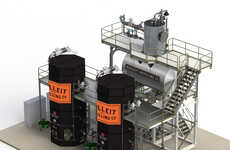
Eco-Fuel Infrastructure May Encourage Non-Food Source Ethanol Production
Katie Cordrey — January 19, 2010 — Autos
References: upi & green.autoblog
There are plans to install an 1,800-mile long pipeline, across Indiana to transport Midwest ethanol markets in the eastern US. The project, proposed by South Dakota-base POET Ethanol Products and Texas-based Magellan Midstream Partners, is pending financing.
Ethanol pipelines may provide the infrastructure that makes the production of biofuels more practical: Wallace Tyner, an agricultural economics department professor at Purdue University said the long-term boom may be to encourage development of ethanol from nonfood sources, like corn cobs and stalks and grass.
Photo: Arthur Chapman, - C.C. Lic. 2.0
Ethanol pipelines may provide the infrastructure that makes the production of biofuels more practical: Wallace Tyner, an agricultural economics department professor at Purdue University said the long-term boom may be to encourage development of ethanol from nonfood sources, like corn cobs and stalks and grass.
Photo: Arthur Chapman, - C.C. Lic. 2.0
Trend Themes
1. Non-food Source Ethanol Production - The installation of ethanol pipelines may encourage the development of ethanol from non-food sources like corn cobs and stalks and grass.
2. Eco-friendly Infrastructure - The installation of ethanol pipelines is a step towards creating an eco-friendly infrastructure for biofuels.
3. Expansion of Ethanol Markets - The proposed 1,800-mile long pipeline may provide more practical transportation for Midwest ethanol markets in the eastern US.
Industry Implications
1. Energy - The installation of ethanol pipelines provides an opportunity for disruption and innovation in the energy industry, encouraging the production of biofuels from non-food sources.
2. Transportation and Logistics - The installation of ethanol pipelines requires the development of new transportation and logistics technologies, opening opportunities for disruptive innovation in these industries.
3. Agriculture - The development and expansion of non-food source ethanol production has the potential to disrupt the agriculture industry by providing new revenue streams for farmers.
2.9
Score
Popularity
Activity
Freshness























